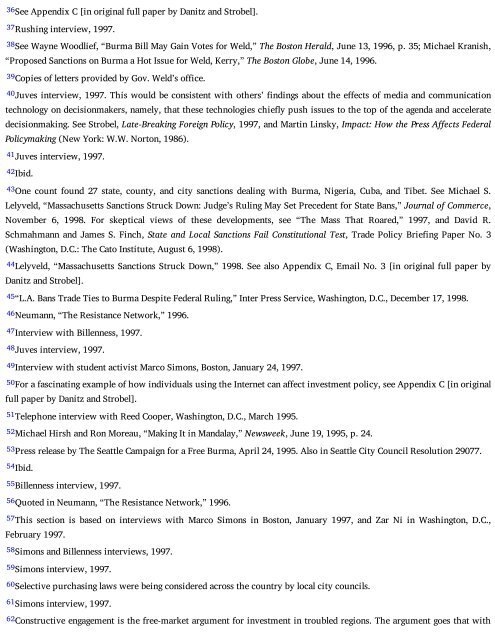RAND_MR1382
You also want an ePaper? Increase the reach of your titles
YUMPU automatically turns print PDFs into web optimized ePapers that Google loves.
36 See Appendix C [in original full paper by Danitz and Strobel].<br />
37 Rushing interview, 1997.<br />
38 See Wayne Woodlief, “Burma Bill May Gain Votes for Weld,” The Boston Herald, June 13, 1996, p. 35; Michael Kranish,<br />
“Proposed Sanctions on Burma a Hot Issue for Weld, Kerry,” The Boston Globe, June 14, 1996.<br />
39 Copies of letters provided by Gov. Weld’s office.<br />
40 Juves interview, 1997. This would be consistent with others’ findings about the effects of media and communication<br />
technology on decisionmakers, namely, that these technologies chiefly push issues to the top of the agenda and accelerate<br />
decisionmaking. See Strobel, Late-Breaking Foreign Policy, 1997, and Martin Linsky, Impact: How the Press Affects Federal<br />
Policymaking (New York: W.W. Norton, 1986).<br />
41 Juves interview, 1997.<br />
42 Ibid.<br />
43 One count found 27 state, county, and city sanctions dealing with Burma, Nigeria, Cuba, and Tibet. See Michael S.<br />
Lelyveld, “Massachusetts Sanctions Struck Down: Judge’s Ruling May Set Precedent for State Bans,” Journal of Commerce,<br />
November 6, 1998. For skeptical views of these developments, see “The Mass That Roared,” 1997, and David R.<br />
Schmahmann and James S. Finch, State and Local Sanctions Fail Constitutional Test, Trade Policy Briefing Paper No. 3<br />
(Washington, D.C.: The Cato Institute, August 6, 1998).<br />
44 Lelyveld, “Massachusetts Sanctions Struck Down,” 1998. See also Appendix C, Email No. 3 [in original full paper by<br />
Danitz and Strobel].<br />
45 “L.A. Bans Trade Ties to Burma Despite Federal Ruling,” Inter Press Service, Washington, D.C., December 17, 1998.<br />
46 Neumann, “The Resistance Network,” 1996.<br />
47 Interview with Billenness, 1997.<br />
48 Juves interview, 1997.<br />
49 Interview with student activist Marco Simons, Boston, January 24, 1997.<br />
50 For a fascinating example of how individuals using the Internet can affect investment policy, see Appendix C [in original<br />
full paper by Danitz and Strobel].<br />
51 Telephone interview with Reed Cooper, Washington, D.C., March 1995.<br />
52 Michael Hirsh and Ron Moreau, “Making It in Mandalay,” Newsweek, June 19, 1995, p. 24.<br />
53 Press release by The Seattle Campaign for a Free Burma, April 24, 1995. Also in Seattle City Council Resolution 29077.<br />
54 Ibid.<br />
55 Billenness interview, 1997.<br />
56 Quoted in Neumann, “The Resistance Network,” 1996.<br />
57 This section is based on interviews with Marco Simons in Boston, January 1997, and Zar Ni in Washington, D.C.,<br />
February 1997.<br />
58 Simons and Billenness interviews, 1997.<br />
59 Simons interview, 1997.<br />
60 Selective purchasing laws were being considered across the country by local city councils.<br />
61 Simons interview, 1997.<br />
62 Constructive engagement is the free-market argument for investment in troubled regions. The argument goes that with










![Genki - An Integrated Course in Elementary Japanese II [Second Edition] (2011), WITH PDF BOOKMARKS!](https://img.yumpu.com/58322134/1/180x260/genki-an-integrated-course-in-elementary-japanese-ii-second-edition-2011-with-pdf-bookmarks.jpg?quality=85)
![Genki - An Integrated Course in Elementary Japanese I [Second Edition] (2011), WITH PDF BOOKMARKS!](https://img.yumpu.com/58322120/1/182x260/genki-an-integrated-course-in-elementary-japanese-i-second-edition-2011-with-pdf-bookmarks.jpg?quality=85)





